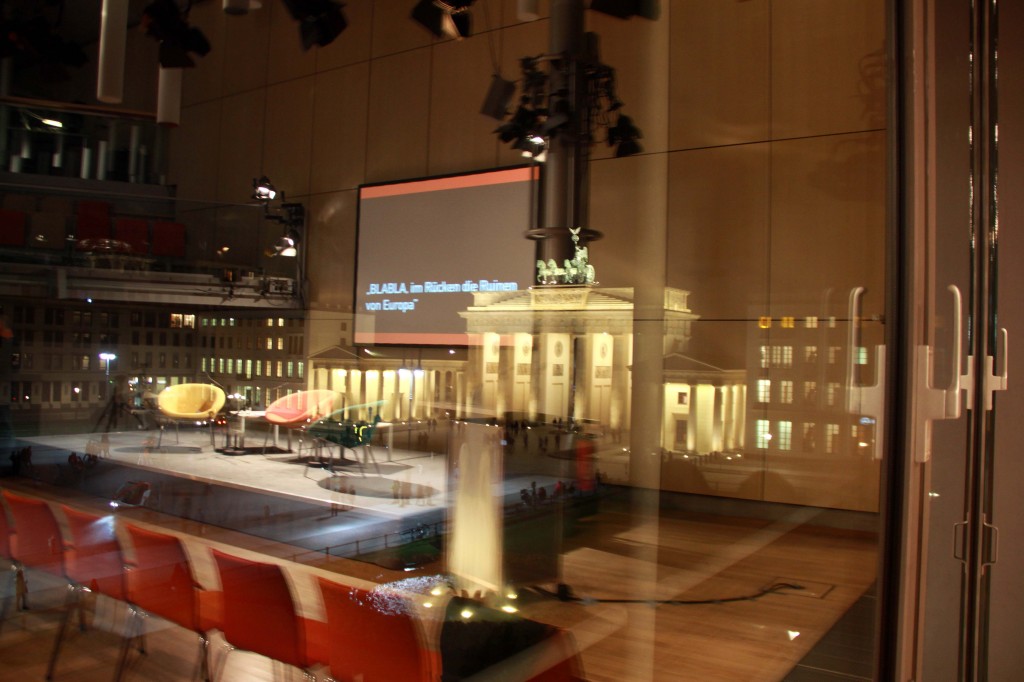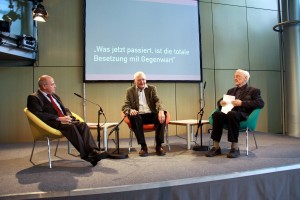The Enigma of Freedom – A Transatlantic Conference on the Significance of Heiner Müller for the 21st Century on the Day of German Unity, October 3-5, 2014
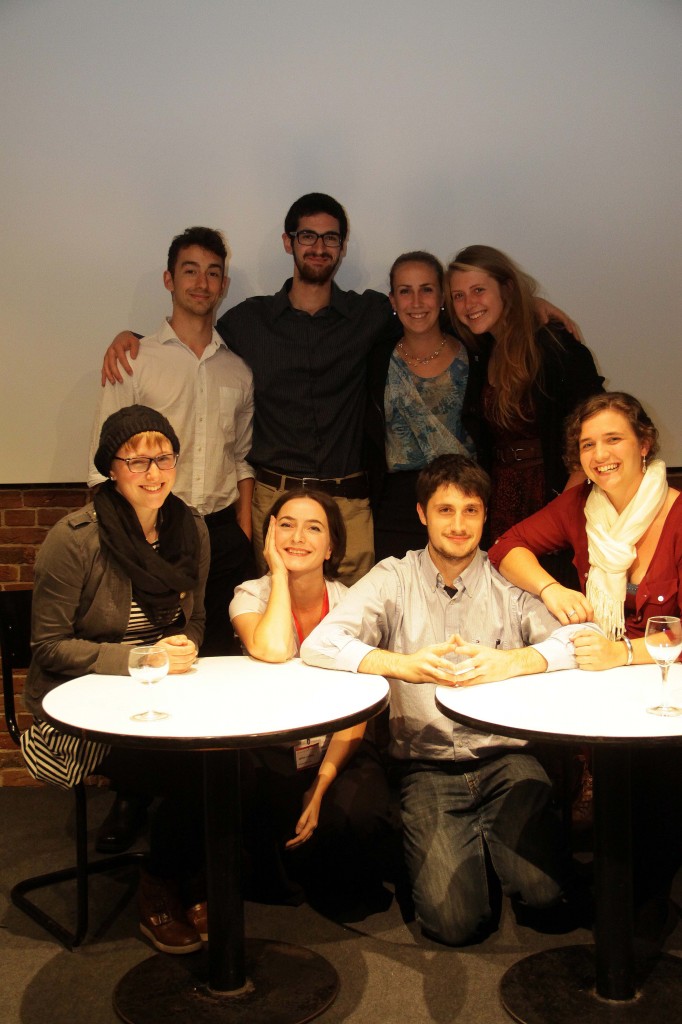
front row: Adrienne, J. Ludwig, Ezra, Rachel (from left to right), back row: Santiago, George, Cassie, Katie ©: Uwe Fechner
The Dickinson students currently on their year abroad at the University of Bremen had a unique opportunity to experience German culture and recent history from an exceptional angle. On a five-day excursion to Berlin, they not only explored historical and cultural sites such as the Brandenburg Gate or the Reichstag, but also attended a conference on one of the most influential cultural figures of 20th century Germany: the playwright Heiner Müller. The conference was co-organized by the Academic Director of the Durden Bremen Program, Janine Ludwig, together with Anja Quickert and Florian Becker on behalf of the International Heiner Müller Society.
At the conference, the students had the opportunity to hear and meet many important German (and American) intellectuals – among them:
 Gregor Gysi (parliamentary party leader of “The Left”), Jens Reich (molecular biologist, GDR civil rights activist and former candidate for the German Presidency), Thomas Martin (chief dramaturg of Berlin’s celebrated avant-garde theater “Volksbühne”), Wolfgang Engler (rector of Germany’s most prominent acting school „Ernst Busch“), Hermann Beyer (long-time actor at the legendary Brecht theater “Berliner Ensemble”), Ivica Buljan (head of the Zagreb International Theatre Festival), David Levine (US-American performance artist, Bard College Berlin), Jost Hermand (renowned literary scholar at the University of Wisconsin-Madison), B.K. Tragelehn (director and long-time friend of Müller’s) – and many more.
Gregor Gysi (parliamentary party leader of “The Left”), Jens Reich (molecular biologist, GDR civil rights activist and former candidate for the German Presidency), Thomas Martin (chief dramaturg of Berlin’s celebrated avant-garde theater “Volksbühne”), Wolfgang Engler (rector of Germany’s most prominent acting school „Ernst Busch“), Hermann Beyer (long-time actor at the legendary Brecht theater “Berliner Ensemble”), Ivica Buljan (head of the Zagreb International Theatre Festival), David Levine (US-American performance artist, Bard College Berlin), Jost Hermand (renowned literary scholar at the University of Wisconsin-Madison), B.K. Tragelehn (director and long-time friend of Müller’s) – and many more.
Find the program flyer attached: IHMG HM-Konferenz Programm-Leporello
Here is what the students said:
I had two favorite parts of the Müller conference. The first was the “Table Talks” during the second afternoon of the conference where the conference goers had the chance to sit and speak with people who were close with Müller both on and off the stage. These “Table Talks” broke the invisible wall between the audience and the presenters and allowed for more questions to be asked and discussions to be had. My other favorite part of the conference was one of the last panels where theater directors from different Eastern European countries compared and contrasted the reception and implementation of Müller’s works in two very different social environments.
— A particular memorable moment for me was when a pair of presenters began to discuss the DEFA and its role in film production in East Germany. This caused me to reflect back on my previous research on the DEFA and actually helped me formulate an idea for my senior thesis in German for next year! Another just generally cool moment was when the group was approached during one of the breaks by a woman who is staging a production of one of Müller’s plays not far from Bremen and invited us as a group to come watch the show and meet the actors. >Rachel Schilling ’16<
Before attending this conference I didn’t know who Heiner Müller was. Now I have a more complete understanding of why he is considered the most important German playwright of the second half of the 20th century. During the conference I was able to speak with one of the last living students of Bertolt Brecht and hear personal stories about Müller and Brecht himself. The event was very well organized and I am thankful that I was able to attend not only this conference but explore the city of Berlin itself. >George DeRosa ‘16<
My favorite part of the conference was a panel which included a philosopher, a cultural journalist, and a dramatic advisor, each of whom had a personal connection with the playwright. I saw right from the beginning the wide variety of people Heiner Müller’s work had influenced. It interested me that the work of a single man could carry so much meaning for three people of such differing professions.
— One of the activities at the conference were Tischgespräche or “Table-Talks,” where audience members could sit on comfortable couches around people who had known Heiner Müller personally and hear stories from time they had shared together. The table I went to included Alexander Weigel, a dramaturg who worked with Müller on two of his plays, “Der Lohndrücker” and “Hamlet/Maschine.” I was especially struck by the stories where Weigel explained the tensions in Hamlet/Maschine between trying to create a political commentary in the play and trying to keep the themes in Hamlet alive. Weigel remembered that Müller said to him: “Shakespeare ist wichtiger als die DDR” or “Shakespeare is more important than the German Democratic Republic.”
— One thing I focused on was expanding my German vocabulary and knowledge of German word-genders, a topic which has always plagued my ability to speak German fluently and confidently. Although my focus and interest in learning German places less emphasis on literature and drama, at the conference I was still able to listen for much information of personal interest. For example, because of the wide variety of the fields of presenters, I learned many German words and expressions which I had not heard before. I also listened for different German dialects (another area of personal interest) among the presenters, as some spoke with a “Berliner” accent. >Ezra Sassaman ’16<
I’m not sure that I have ever heard of Müller before this conference, which is frankly quite embarrassing because he is apparently labeled the second most important German dramatist of the 20th century after Bertolt Brecht. I have a relatively limited knowledge of German history, but this conference helped me to understand what it was like to be an artist working in the GDR. For instance many of Müller’s plays were not allowed to premier or were censored after only one screening. Nonetheless he continued to gain popularity in the West and internationally. Many of his plays were staged in Western Germany, and even his controversial “Mauser” was shown for the first time in Austin, Texas. By the 1980s, the GDR welcomed Müller again because of his international fame.
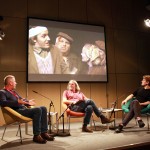
“BLABLA” Panel: Ivica Buljan, Thomas Irmer, Wojtek Klemm (fr. l. t. r.) © all following pictures: Uwe Fechner
My favorite part of the conference was the “BLABLA” section on Sunday because I finally got to see some of Müller’s work on stage. I did not realize how provocative his postmodernist style was until I had seen it. I was honestly surprised the GDR ever decided to support him, regardless of his fame.
— The table talks were a very interesting and unusual addition to the conference. It allowed me to sit and talk with a close friend of Müller’s, B.K. Tragelehn and his wife, and hear about Müller in his youth. He shared many intriguing stories from their youth and told us about Müller’s personal life from an insider’s view.
— Although it was hard to follow the panel “Was jetzt passiert, ist die totale Besetzung mit Gegenwart,” I found this one quote extremely interesting. I’m not sure if it came from Müller, or one of the presenters, but nonetheless it got me thinking. “Socialism leads to individualism, capitalism leads to collectivism.” I really enjoyed being exposed to so many German and international intellectuals and expanding my German and cultural knowledge. It was also very helpful to hear high level academic German before beginning our schooling at the University. >Katie Mooradian ’16<
The conference consisted of very complex and very dense information given all in German all at once. That being said I look at it similar to sports. You don’t get better playing teams on your level, only by playing teams that are better than you, and even though you are getting beat you are learning and increasing your knowledge for the future. Same goes for this conference, the language used and topic were more complex and difficult than the level I was at, but in the end I do feel like I got something out of being there and focusing on trying to understand what the speakers were saying. My favorite part was the table talk where you could go and speak to some of the speakers and other people connected to Heiner Müller. I listened to B.K. Tragelehn and his wife speak and the stories they told were so interesting, and it gave a more personal outlook into Heiner Mueller’s life. I think that was easier for me to understand because it was a more focused group of people with him just talking to 5 or 6 of us. I really did enjoy the table talk immensely. >Cassie Blyler ‘16<
One of the conference panels which I enjoyed the most was the “Tischgespräche mit Zeitgenossen,” which was held on the second day of the conference. This panel had a very flexible and informal approach. The speakers scattered over small coffee tables so all of us could engage them on a more personal level. I joined a conversation with B. K. Tragelehn, a director, author, translator and former student of Bertolt Brecht and friend of Heiner Müller. During the panel, Mr. Tragelehn shared many of his amazingly rich experiences as a student, coworker and independent author as well as some personal insights about Bertolt Brecht, Heiner Müller and his wife Inge Müller. Although my fields of study are unrelated to either theater or literature, getting such a rare opportunity to meet one of the last people who studied and worked with such important characters of history and culture was indeed an amazing experience.
I must say that I was surprised by the wide variety and high caliber of the conference’s guests, which included artists, representatives from literature institutes, widely renowned politicians, academics from all over the world and authors who had the privilege of working side by side with the most important theater personalities of the 20th century and who underwent the whole social and institutional revolution that came with the Fall of the Wall. Unfortunately, I did not get to talk to all of them, but I did get to hear what some of the greatest minds on the theater and literature scene think. The conference also bore unexpected fruits as we got to meet a woman who happened to be involved in the management of a theater in Osnabrück and that offered us (all the members of the Bremen program) to attend one the Heiner Müller’s plays that were being performed there.
— Academically, the conference was a challenging experience. To begin with, most of the panels were in German, so they required lots of concentration and some effort in order to keep up and decipher some of the most complex opinions. Historically and culturally speaking, the conference covered a wide variety of topics. The whole scene of German theater and literature was affected by the geopolitical and socioeconomic changes that happened in Germany throughout and after the Cold War and the Fall of the Wall. Therefore, there was always a very complex background to keep in mind in order to fully understand some of the discussions regarding the importance and the repercussions of Heiner Müller’s work in Germany and nearby countries. I personally felt that every minute of the conference was loaded with information and that it required a lot of thinking to keep up. >Santiago Princ ‘16<
The conference which was supported by Dickinson and Bard College gave me an interesting look into what culture was inside the DDR and in other communist ruled areas of Eastern Europe. Due to the fact that the academic style of German went a little over my head, I gained the most insight from the last session we attended which was held in English. It was comparing the cultural reception of Heiner Müller’s works in Poland and former Yugoslavia. Having gone to another conference this summer about German authors in Poland at the time of its separation from Germany, I enjoyed the extra insights to Polish history and culture. >Adrienne Brown ’16<
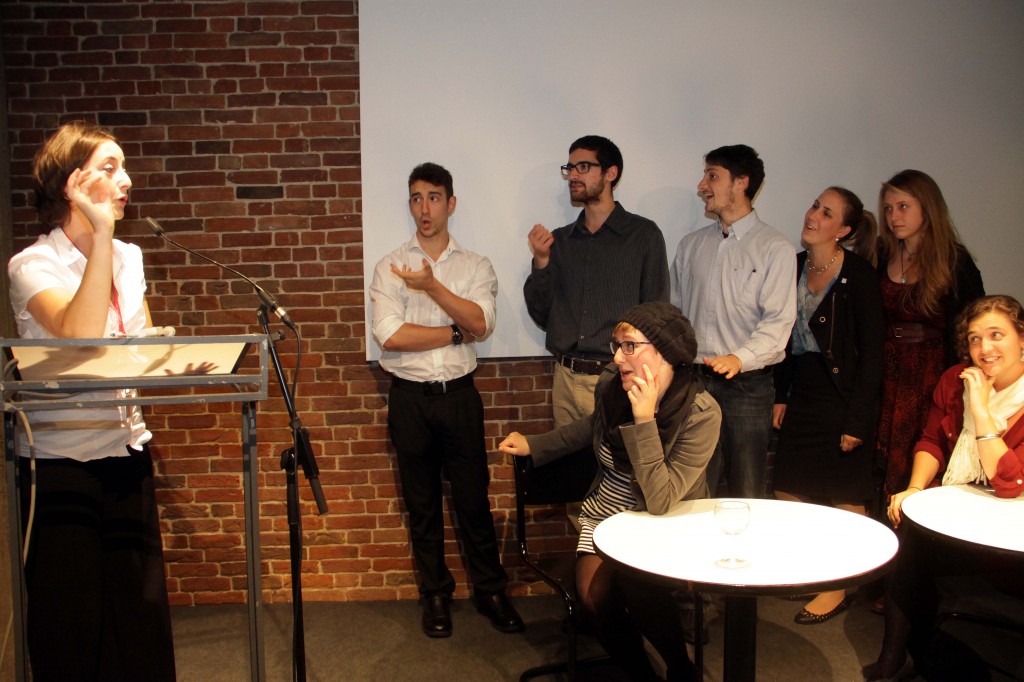
Students are jokingly re-enacting a scene which they just saw in a documentary film about Heiner Müller, made by Thomas Heise. In it, Müller and the famous director Fritz Marquardt were telling actors several times precisely and meticulously how to pronounce a single word (king) in a sentence from Müller’s play “Germania Death in Berlin”: „Will er nicht aufstehen vor seinem König?” (Does he not want to stand up before his King?). In the front, from left to right: Janine Ludwig, Adrienne Brown, Rachel Schilling. From left to right in the back row: Santiago Princ, George DeRosa, Ezra Sassaman, Cassandra Blyler, Katherine Mooradian
What colleagues say:
Statement by co-organizer Ludwig:
 I think the students appreciated the historically rich venues like the Academy of the Arts in East and West Berlin, on both sides of the once-divided city which is not just the
I think the students appreciated the historically rich venues like the Academy of the Arts in East and West Berlin, on both sides of the once-divided city which is not just the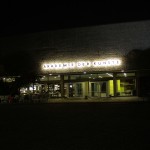 political capital of Germany, but the cultural capital as well. By embedding the conference into a Berlin excursion, I was hoping to enable them to connect their adventures in the historic city and in its current cultural scene with the contents of this conference.
political capital of Germany, but the cultural capital as well. By embedding the conference into a Berlin excursion, I was hoping to enable them to connect their adventures in the historic city and in its current cultural scene with the contents of this conference.

